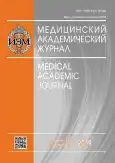THE EFFECTS OF ALLOFERON (ALLOKIN) IN THE THERAPY OF METABOLIC SYNDROME (A PILOT STUDY)
- Authors: Didkovsky NA1, Malashenkova IK1,2, Abakumova JV3, Ogurtsov DP1,2, Krynskiy SA2, Hailov NA2, Chekulaeva EI2, Mamoshina MV2
-
Affiliations:
- FSBI FCRC of Physical-Chemical Medicine FMBA of Russia, Moscow
- NRC “Kurchatov Institute”, Moscow
- Saratov branch of the Samara Medical University “Reaviz”, Samara
- Issue: Vol 19, No 1S (2019)
- Pages: 212-215
- Section: Articles
- Published: 15.12.2019
- URL: https://journals.eco-vector.com/MAJ/article/view/19403
- ID: 19403
Cite item
Abstract
Full Text
About the authors
N A Didkovsky
FSBI FCRC of Physical-Chemical Medicine FMBA of Russia, Moscow
I K Malashenkova
FSBI FCRC of Physical-Chemical Medicine FMBA of Russia, Moscow; NRC “Kurchatov Institute”, Moscow
J V Abakumova
Saratov branch of the Samara Medical University “Reaviz”, Samara
D P Ogurtsov
FSBI FCRC of Physical-Chemical Medicine FMBA of Russia, Moscow; NRC “Kurchatov Institute”, Moscow
S A Krynskiy
NRC “Kurchatov Institute”, Moscow
N A Hailov
NRC “Kurchatov Institute”, Moscow
E I Chekulaeva
NRC “Kurchatov Institute”, Moscow
M V Mamoshina
NRC “Kurchatov Institute”, Moscow
References
- Gregor MF, Hotamisligil GS. Inflammatory mechanisms in obesity. Annu Rev Immunol. 2011;29:415-45.
- Pavlov VA, Tracey KJ. The vagus nerve and the inflammatory reflex--linking immunity and metabolism. Nat Rev Endocrinol. 2012;8(12):743-54.
- de Melo LGP, Nunes SOV, Anderson G, et al. Shared metabolic and immune-inflammatory, oxidative and nitrosative stress pathways in the metabolic syndrome and mood disorders. Prog Neuropsychopharmacol Biol Psychiatry. 2017;78:34-50.
- Van Herck MA, Weyler J, Kwanten WJ, et al. The Differential Roles of T Cells in Non-alcoholic Fatty Liver Disease and Obesity. Front Immunol. 2019;10:82.
- Francisco V, Pino J, Campos-Cabaleiro V, et al. Obesity, Fat Mass and Immune System: Role for Leptin. Front Physiol. 2018;9:640.
- Scheithauer TP, Dallinga-Thie GM, de Vos WM, et al. Causality of small and large intestinal microbiota in weight regulation and insulin resistance. Mol Metab. 2016;5(9):759-70.
- Sobieszczyk ME, Werner L, Mlisana K, et al. Metabolic Syndrome After HIV Acquisition in South African Women. J Acquir Immune Defic Syndr. 2016; 73(4): 438-445.
Supplementary files







